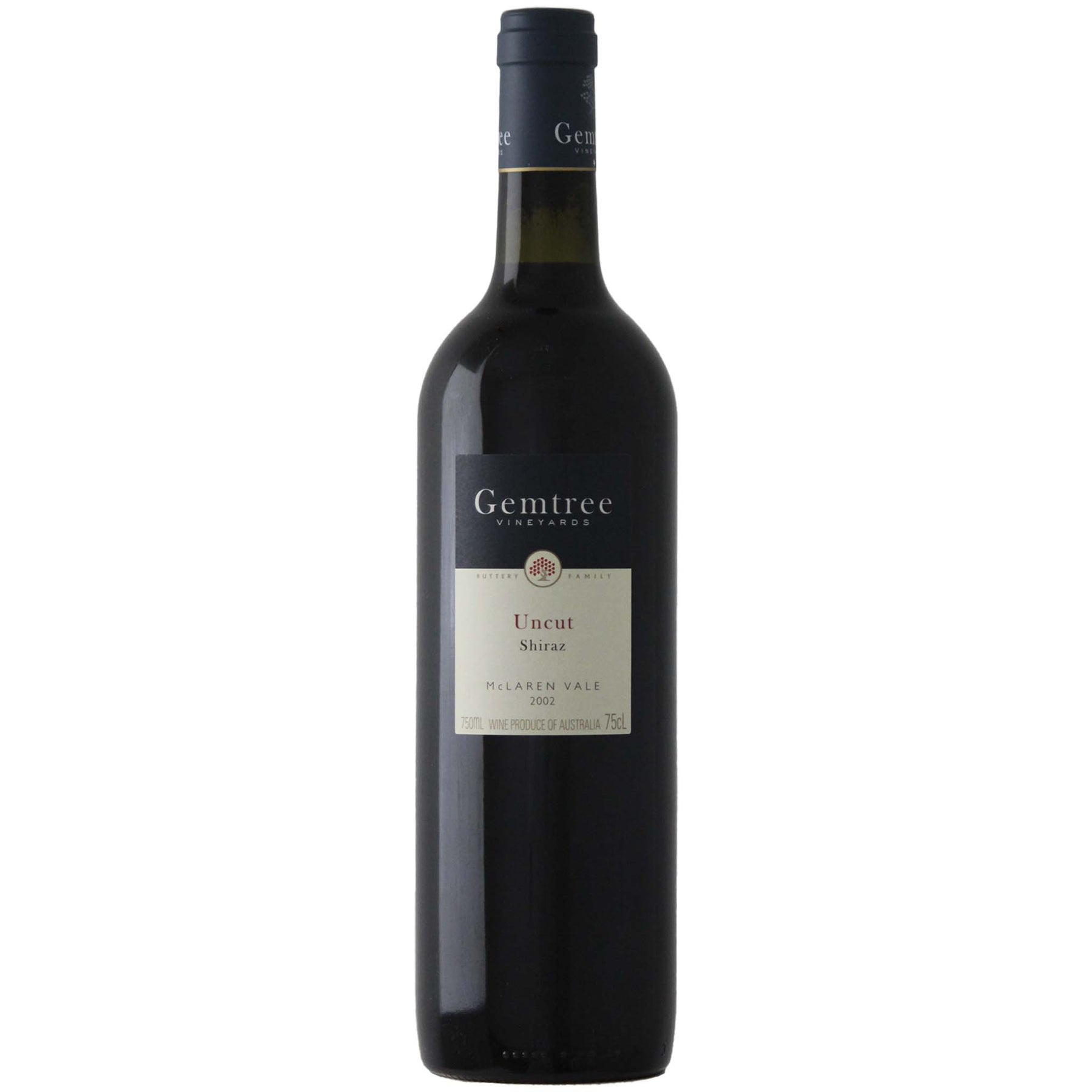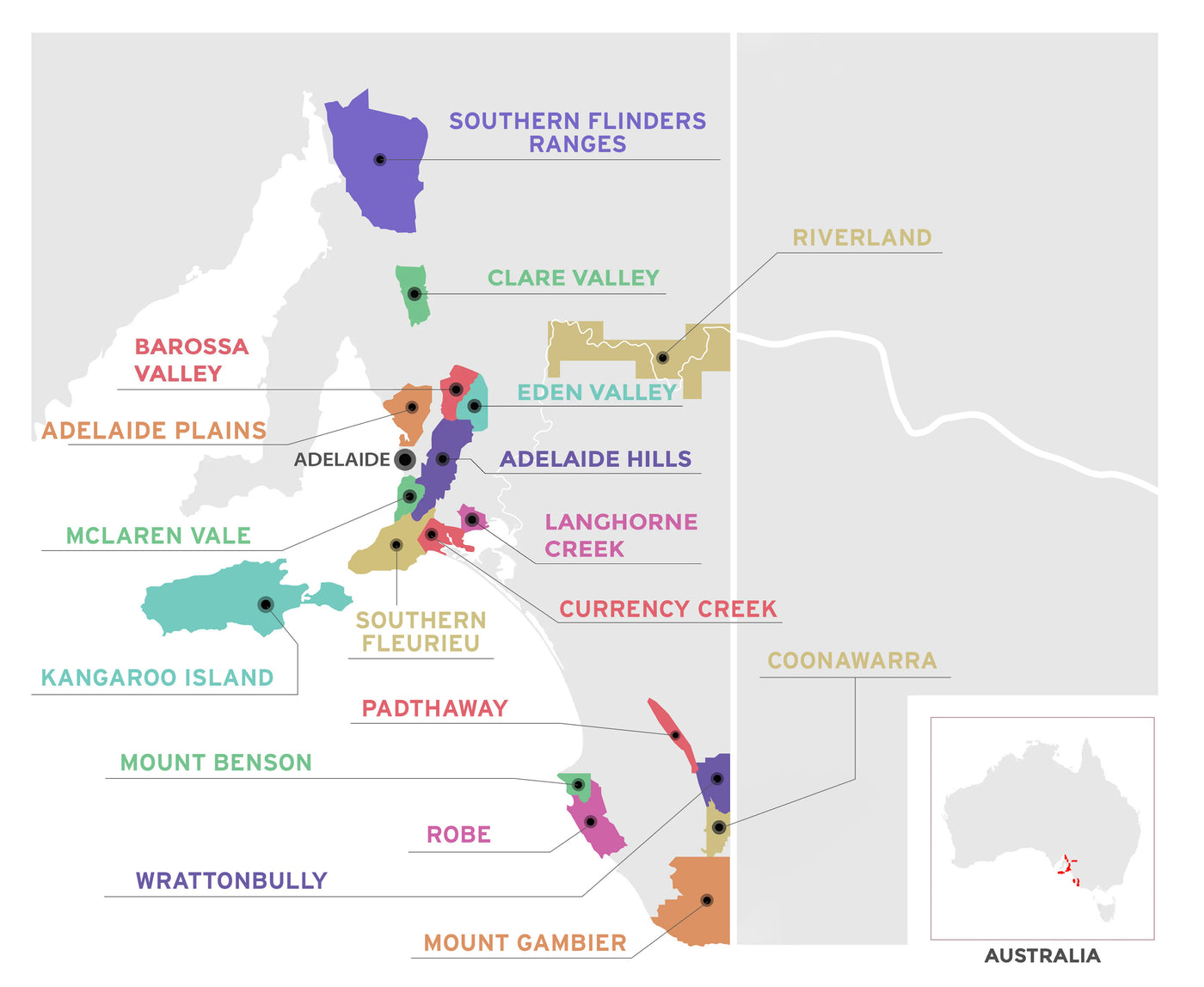

Gemtree Uncut Shiraz 2002
Style: Red Wine
Variety: Shiraz
Closure: Cork
Gemtree Uncut Shiraz 2002
Warehouse
34 Redland Drive
Vermont VIC 3133
Australia
Critic Score: 92 and 18.5/20
Alcohol: 14.5%
Size: 750 ml
Drink by: Now
Trophy, Best International Rhone Varietal – 2004 Decanter World Wine Awards
Trophy, Best Australian Rhone Varietal – 2004 Decanter World Wine Awards
Tyson Stelzer Top 500 Wines 2005-2006
Melissa and Mike Brown took over the reins of the family vineyard off Elliot Road in McLaren Flat in 1994 and four years later launched their own label, Gemtree Wines. Melissa revolutionised the vineyard, became an expert in biodynamic and organic farming, and obtained full organic certification in 2011. The Gemtree Uncut Shiraz was the first wine they produced and quickly established a reputation as a smooth and generous McLaren Vale Shiraz that offered exceptional value for money.
"Gemtree is a small McLaren Vale-based label whose 2002 releases look very impressive indeed. At a price that barely buys half a bottle of many of its regional competitors, Gemtree's latest Shiraz offers typical regional richness and flavour without any of the over-cooked characters so common these days amongst the wines of its neighbours. Matured largely in French cooperage, the Shiraz is smooth, deeply fruited and elegant, and easily carries its relatively modest 14.5% alcohol." Jeremy Oliver
Expert reviews
"Colour: dark red brick; Aroma: blueberry, chocolate mints, creamy; Palate: noticed the higher acid – not the weight of the 01 but great length. Amazing structure – a pup. Has always been the sleeper in the portfolio. Cellar: 15 – 20 years." Gemtree Winery Vertical Tasting (March 2007) – 18.75 points
"Intense cherry/plum fruit has been kissed by the cool 2002 season with a large dob of mint, trailing off into a long, finely-structured finish. Best drinking around: 2007-2012." Tyson Stelzer - 92 points and Top 500 Wines 2005-2006
"Clean, supple and round; medium-bodied, fruit driven by blackberry and chocolate; sweet, ripe tannins. Best drinking: Now-2012." James Halliday, Halliday Wine Companion - 92 points
"With over 1640 wineries fighting to find shelf space in Australia today, any new entrant to the marketplace has little choice but to over-deliver in terms of quality and presentation... While its first release was a Shiraz from 1998, Gemtree is a small McLaren Vale-based label whose 2002 releases look very impressive indeed. At a price that barely buys half a bottle of many of its regional competitors, Gemtree's latest Shiraz and Tempranillo dry reds offer typical regional richness and flavour without any of the over-cooked characters so common these days amongst the wines of its neighbours. Matured largely in French cooperage, the Shiraz is smooth, deeply fruited and elegant, and easily carries its relatively modest 14.5% alcohol... At around $25 and less, these new releases from Gemtree certainly fulfil the very steep requirements for it to survive and then thrive as an important McLaren Vale brand." Jeremy Oliver
"This wine is one of a number of outstanding reds from the 2002 vintage in McLaren Vale that have been released recently. Lovely floral, scented nose leads into an impeccably balanced wine that is full of blackberry and plum fruit with delicious chocolate overtones. Lovely drinking now but will improve in the cellar. This is not one of the ball-buster reds from McLaren Vale, but a superbly soft, elegant example that fills and caresses the mouth." Nick Munday, Canterbury Wines
Awards
Trophy, Best Australian Rhone Varietal – 2004 Decanter World Wine Awards
Tyson Stelzer Top 500 Wines 2005-2006
Gold Medal – 2004 Decanter World Wine Awards
Melissa Brown

Melissa Brown (Viticulturist) and husband Mike (Winemaker)
A third-generation grape grower, Melissa Brown never intended to join the family business. When she did, she revolutionised the vineyard. Now she’s a leader in sustainable winemaking. Melissa started working with vines in 1994, the year she met Mike, her future husband. Four years later they launched their own label, Gemtree Wines, in the scenic McLaren Vale wine region. As Viticulturist, Melissa grows the grapes in the family vineyard and Mike, as Chief Winemaker and Managing Director, makes the wine. Together they take a minimal intervention approach, letting nature lead the way.
Growing up around her parents’ vineyards in South Australia’s famous McLaren Vale wine region, Melissa had no interest in getting involved. But after returning from an overseas trip and feeling uncertain about what to do with her life, she asked her father if she could work in the vineyard. He said, "Sure, but you’ll last two weeks because you’re too soft," says Melissa. "And that was 25 years ago." Melissa made some big changes when she took over the vineyard. "I really care about the environment, so I get a lot of satisfaction out of being able to grow my grapes in a natural way," she says. "I’m improving the soils and the land that I’m custodian of."
Over the years, Melissa transformed the vineyard, first adopting organic practices and then going biodynamic. "I have children and I want to hand over to them land in a better condition than it was handed to me in," she says. "I want the environment to be the same beautiful environment that I’ve grown up in." In the winery, husband Mike takes a similarly light-touch approach, using minimal intervention techniques to craft wines that showcase Melissa’s work in the vineyard.
The text below is taken from an article on Melissa Brown that appeared in Young Gun of Wine
With the vineyard situated in McLaren Flat, the Gemtree mission is very much an ongoing quest to improve wine quality, but their ethos is inseparable from a desire to have a positive environmental impact both locally and globally. With an eye to the future, viticulturist Melissa Brown has planted varieties suited to an ever-warming Mediterranean climate – like nero d’avola and fiano – alongside the Vale classics of shiraz and grenache. The 123-hectare vineyard has been managed using biodynamic methods since 2007 – with it certified for a decade – to encourage a 'living soil' and build resilience in the vines, while an eco-reserve has been established to restore native flora and fauna, as well as to educate visitors.
After a period of study and travel, Melissa Brown returned to the family vineyard in 1994 to work amongst the vines. What followed was both onsite training and a formal education as a viticulturist, which eventually led to an interest in organic practices. Starting with a single block of tempranillo, Brown was encouraged by the life that was returning to the soil and the vines, along with improvements in the fruit, and began managing all the vines organically, with biodynamic practices implemented from 2007. The whole Gemtree vineyard was certified (ACO) in 2011.
"Climate change is our biggest challenge, which has an impact on the quality of our grapes in terms of flavour and tannin ripeness," says Brown. "I’m changing to varieties that are better suited to a warmer climate and also will be trialling techniques for mitigating the negative consequences of excessive temperatures, such as canopy cooling."
The vineyard has been progressively planted since 1968 to now occupy 125 hectares, with the varietal mix nuanced over time to address a warm region that is getting warmer still. While the region’s lead varieties – shiraz, grenache, cabernet sauvignon, merlot and chardonnay – are all represented in the vineyard, so too are mataro, nero d’avola, savagnin, fiano, verdelho, albariño, tempranillo and zinfandel, with a suitability to the Mediterranean climate key to their inclusion.
"Climate change is our biggest challenge, which has an impact on the quality of our grapes in terms of flavour and tannin ripeness. I’m changing to varieties that are better suited to a warmer climate and will be trialling techniques for mitigating the negative consequences of excessive temperatures, such as canopy cooling," says Brown, though she notes that tackling the larger issue is the real challenge. "We are doing our best to reduce our greenhouse gas emissions… I wish I had access to electric 4WD utilities and tractors."
There is no doubt that Gemtree has been a leader in McLaren Vale – and the country – in applying and promoting organic and biodynamic methods, and on a large scale, but Brown notes that the region is not lagging behind, and it is that kinship of spirit that helps drive further progress.
"The bar is set high here in McLaren Vale," she says, "with over 37 per cent of our vineyards being certified organic and biodynamic, and we also developed the SWA [Sustainable Winegrowing Australia] program with a very high number of participants. There is a healthy level of competition, but we all support each other as well and are happy to share information for the benefit of others and our region."
While vine health and fruit quality are very much a driving force for Brown, Gemtree is a holistic endeavour. "Economically, collectively with the wine business we employ over 40 local people, providing an income and stable employment with a big focus on making our employees feel valued and a part of the larger Gemtree family," says Brown. Additionally, there is a good deal of emphasis placed on addressing and educating about organic and biodynamic practices, as well as broader environmental issues.
"From the conversion from conventional to biodynamic practices, we saw a gradual improvement in soil and vine health, but we didn’t see it transform the wines until around 2017, after 10 years," she says. "From that vintage on, we saw a noticeable difference in thicker skins, more colour density and flavour."
"I’m hugely concerned about the state of our planet, and I feel compelled to do something," says Brown. "It’s what drives me. I think of myself as a passive activist – I lead by example. I am privileged to be in a position to influence my team, as well as customers, through education about what we can all do to help our planet, so it’s important to me that I maximise that opportunity."
That ethos has seen the development of an onsite native reserve and sanctuary. "The Gemtree Ecotrail is a unique site of 10 hectares that was once a degraded piece of land that we have restored and revegetated with the planting of over 50,000 native trees and shrubs," says Brown. "This contributes to the biodiversity of our vineyards, as well as providing a safe habitat for native animals. It’s also a beautiful space for the community and visitors to enjoy."
The site includes a koala gunya, or shelter, where rescued koalas rehabilitate before release, and in 2021 Brown introduced a cultural tour hosted by Senior Custodian and traditional owner Karl Winda Telfer from the Mullawirra Meyunna (dry forest people) of the Adelaide Region. "’Tirkandi’ takes people on a journey throughout the trail learning about the importance of connection between land, sea, sky and country to the Aboriginal culture," says Brown.
The focus on native vegetation isn’t limited to the Ecotrail, with large sections of remnant vegetation maintained across the vineyard, which encourages biodiversity, as well as fostering beneficial predatory insect populations. A grass sward and cover crops are maintained throughout the mid-rows in the vineyard, which are rolled rather than cultivated, while weeds are managed with under-vine mowers, a dodge plough and through rotational grazing of sheep.
Gemtree’s power needs are also significantly supported by solar power, with irrigation pumps, the winery and cellar door (which was constructed out of recycled and sustainable materials) all fitted with their own solar units. Gemtree is also a member of Cleanhub, helping to fund the collection and effective disposal of nonrecyclable plastics worldwide, as well as having personally removed and recycled over 11 tonnes of old irrigation lines, amongst other initiatives to reduce the environmental impact of the business.
"I would like our business to become carbon neutral or even better, carbon positive!" declares Brown. "We’re managing climate change by focusing on soil health, which has an on-flow effect of resilience in the vines, as well considering our actions to try and minimise our greenhouse gas emissions and pollution in general. This year I have started applying compost tea brews to the soil to build up the soil microbiome, which is all important to soil health and nutrition for the vines. We are testing and looking at soil samples under the microscope to measure the results of these applications. The end goal is to eliminate tillage on the vineyard."
It’s certainly a long-game approach at Gemtree, both for the wines they make and the bigger-picture environmental goals, but Brown is nothing if not patient. "From the conversion from conventional to biodynamic practices, we saw a gradual improvement in soil and vine health, but we didn’t see it transform the wines until around 2017, after 10 years," she says. "From that vintage on, we saw a noticeable difference in thicker skins, more colour density and flavour."
This has resulted in wines – made by her husband Mike – that Brown believes are now more vibrant and with a natural harmony. "The vines are producing grapes that are more balanced and the wines ferment cleaner, meaning they don’t require fining to remove unwanted compounds. The wines now have an energy about them waiting to be unleashed in the glass."
About the winery

Paul and Jill Buttery started the Gemtree story when they purchased land off Elliot Road in McLaren Flat in the 1980s and established the first vineyards. When their daughter Melissa returned home from an overseas trip in 1994, she asked her father if she could work in the vineyard. Melissa made some big changes and revolutionised the vineyard. Now she’s a leader in sustainable winemaking.
That same year, Melissa met her soon-to-be husband, Mike Brown, and together they took over the reins of the family business. Four years later, in 1998, they launched their own label, Gemtree Wines.
Right from the outset, the decision was made to work with nature, not against it. Recognising the benefit of a sustainable approach, Melissa embarked on a learning journey, becoming a qualified viticulturist and an expert in biodynamic and organic farming. Beginning with several small patches of Tempranillo, organic and biodynamic practices were slowly introduced, which saw significant improvement in vineyard health and the production of intensely flavoured fruit.
These sustainable practices were slowly rolled out across the property, transforming the vineyards and culminating in full organic certification in 2011. "I have children and I want to hand over to them land in a better condition than it was handed to me in," she says. "I want the environment to be the same beautiful environment that I’ve grown up in." In the winery, husband Mike took a similarly light-touch approach, using minimal intervention techniques to craft wines that showcased Melissa’s work in the vineyard.
"From the conversion from conventional to biodynamic practices, we saw a gradual improvement in soil and vine health, but we didn’t see it transform the wines until around 2017, after 10 years," Melissa says. "From that vintage on, we saw a noticeable difference in thicker skins, more colour density and flavour."
"I’m hugely concerned about the state of our planet, and I feel compelled to do something," says Melissa. "It’s what drives me." That ethos has seen the development of an onsite native reserve and sanctuary. "The Gemtree Ecotrail is a unique site of 10 hectares that was once a degraded piece of land that we have restored and revegetated with the planting of over 50,000 native trees and shrubs," she says. "This contributes to the biodiversity of our vineyards, as well as providing a safe habitat for native animals. It’s also a beautiful space for the community and visitors to enjoy."
Melissa and Mike Brown sold Gemtree Wines to the Randall Wine Group in October 2023. Randall Wine Group is the largest private premium vineyard holder in Australia, owning over 9,000 acres in eight South Australian wine regions.

South Australia
South Australian is responsible for more than half the production of all Australian wine. It is home to more than 900 wineries across 18 wine regions. The regions are Adelaide Hills, Adelaide Plains, Barossa Valley, Clare Valley, Coonawarra, Currency Creek, Eden Valley, Kangaroo Island, Langhorne Creek, McLaren Vale, Mount Benson, Mount Gambier, Padthaway, Riverland, Robe, Southern Fleurieu, Southern Flinders Ranges and Wrattonbully.
Many of the well-known names in the South Australian wine industry established their first vineyards in the late 1830s and early 1840s. The first vines in McLaren Vale were planted at Reynella in 1839 and Penfold's established Magill Estate on the outskirts of Adelaide in 1844.
South Australia has a vast diversity in geography and climate which allows the State to be able to produce a range of grape varieties - from cool climate Riesling in the Clare and Eden Vallies to the big, full bodied Shiraz wines of the Barossa Valley and McLaren Vale. Two of Australia's best-known wines, Penfolds Grange and Henschke Hill of Grace, are produced here. There is much to discover in South Australia for the wine lover.

